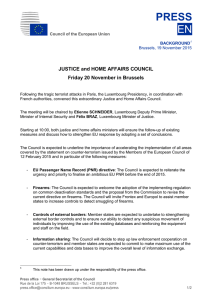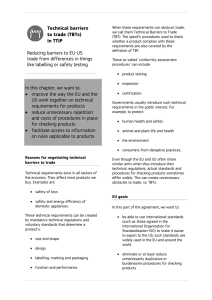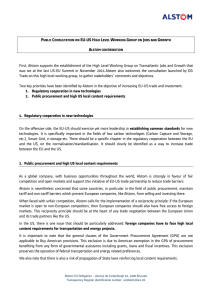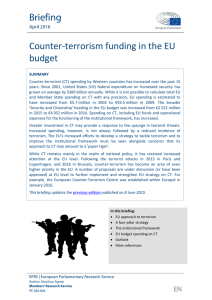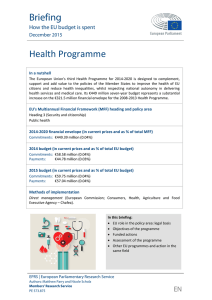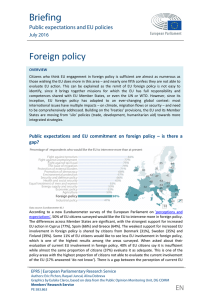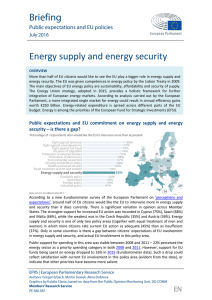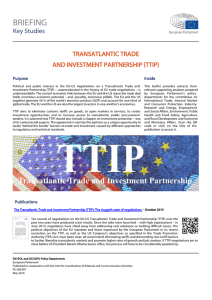EU-US cooperation in Justice and Home Affairs – an overview
Anuncio
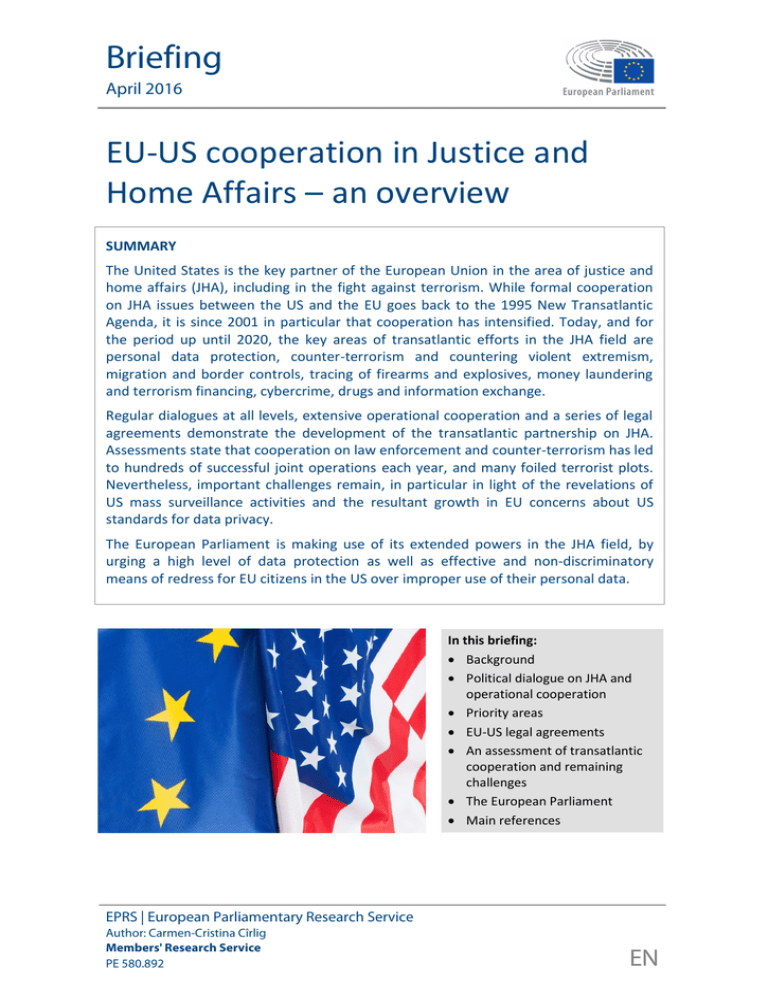
Briefing
April 2016
EU-US cooperation in Justice and
Home Affairs – an overview
SUMMARY
The United States is the key partner of the European Union in the area of justice and
home affairs (JHA), including in the fight against terrorism. While formal cooperation
on JHA issues between the US and the EU goes back to the 1995 New Transatlantic
Agenda, it is since 2001 in particular that cooperation has intensified. Today, and for
the period up until 2020, the key areas of transatlantic efforts in the JHA field are
personal data protection, counter-terrorism and countering violent extremism,
migration and border controls, tracing of firearms and explosives, money laundering
and terrorism financing, cybercrime, drugs and information exchange.
Regular dialogues at all levels, extensive operational cooperation and a series of legal
agreements demonstrate the development of the transatlantic partnership on JHA.
Assessments state that cooperation on law enforcement and counter-terrorism has led
to hundreds of successful joint operations each year, and many foiled terrorist plots.
Nevertheless, important challenges remain, in particular in light of the revelations of
US mass surveillance activities and the resultant growth in EU concerns about US
standards for data privacy.
The European Parliament is making use of its extended powers in the JHA field, by
urging a high level of data protection as well as effective and non-discriminatory
means of redress for EU citizens in the US over improper use of their personal data.
In this briefing:
Background
Political dialogue on JHA and
operational cooperation
Priority areas
EU-US legal agreements
An assessment of transatlantic
cooperation and remaining
challenges
The European Parliament
Main references
EPRS | European Parliamentary Research Service
Author: Carmen-Cristina Cîrlig
Members' Research Service
PE 580.892
EN
EPRS
EU-US cooperation on JHA issues
Background
Formal EU-US cooperation on justice and home affairs (JHA) started in 1995, on the
basis of the New Transatlantic Agenda and the Joint EU-US Action Plan, and was
significantly reinforced after the 9/11 attacks.1 In particular, cooperation on crossborder law enforcement and intelligence, including counter-terrorism, has been one of
the EU's key priorities since 2001; today the relationship with the USA is the EU's most
advanced in this area. In particular, EU-US cooperation has been focused on the fight
against terrorism and transnational crime, law enforcement and information exchange
for law enforcement, protection of personal data, border management, visa and
migration policies, and cybersecurity and cybercrime.
The US has increasingly recognised the EU as an actor in its own right (rather than the
Member States) in the JHA area. Regular high-level political and security dialogue,
extensive contacts, inter-agency operational cooperation, as well as a series of legal
agreements between the US and the EU are evidence of this recognition, and of the
evolution of the transatlantic partnership on JHA matters. Nevertheless, despite the
continued emphasis on shared values, significant challenges to cooperation remain due
to the different EU and US approaches. The revelations of US mass surveillance
programmes and intelligence collection in Europe have affected transatlantic trust, and
intensified EU concerns about data privacy and information exchange on the other side
of the Atlantic. Other tensions have arisen in respect of US detainee policies, differences
in terrorist designation lists in the US and EU, as well as border control and security
measures.
Political dialogue on JHA and operational cooperation
The political dialogue on justice and home affairs issues, including counter-terrorism, is
the EU's most advanced with any third country, considering the number and level of
contacts and the extensive policy cooperation. These links between officials on both
sides of the Atlantic have increased since 2001 and, today, EU-US meetings take place
regularly at both ministerial and senior official level:
Biannual ministerial meetings on justice and home affairs;
Biannual JHA informal high-level meetings (normally at the start of each six-month
EU Council presidency);
Biannual political dialogues on terrorism between the US State Department and the
European External Action Service (EEAS); and between the Commission and the US
Department of Justice;2
Biannual dialogue of legal advisers of the EU, Member States and the US State
Department, on counter-terrorism and international law;
Steering committee on countering violent extremism (several times a year);
Dialogue on terrorist financing;
High-level policy dialogue on border and transport security;
EU-US Working Group on Cybercrime and Cybersecurity;
Expert-level dialogue on protection of critical infrastructure.
EU-US cooperation at operational level is also highly developed, and is now a daily
event for internal security and intelligence agencies, judicial authorities, treasury and
trade authorities, border security and transport authorities. Law enforcement agencies
share data and intelligence, and conduct joint operations. For example, joint operations
Members' Research Service
Page 2 of 12
EPRS
EU-US cooperation on JHA issues
in the counter-terrorism area have been run against identified terrorist networks,
including coordinated freezing of financial assets and the surveillance and disruption of
their means of online communication. According to Europol, in 2014 alone, more than
600 international operations were initiated in cooperation with US federal agencies
leading to many operational successes in various crime areas, including against 'darknet'
marketplaces, large-scale violation of intellectual property rights, currency counterfeiting, cybercrime and organised crime groups involved in the distribution of child
sexual exploitation material. Of a yearly average of 500 operations initiated in
cooperation with the US, around 50 are considered high-impact operations.
The mutual exchange of liaison officers has also advanced inter-agency and operational
cooperation: two Europol liaison officers are posted in Washington DC, while US liaison
officers from 11 federal agencies are posted to Europol and a permanent liaison
prosecutor works at Eurojust.
Priority areas
In October 2009, EU and US ministers adopted the Washington Statement on enhancing
transatlantic cooperation in the Area of Justice, Freedom and Security, which set out
the principles and main areas of EU-US cooperation, such as mobility, law enforcement,
counter-terrorism, judicial cooperation, fundamental freedoms, resilience and
international cooperation for the following five years. The EU and US intended to build
on the progress achieved up to that point (on customs cooperation, extradition and
mutual assistance, passenger name records (PNR), and operational arrangements) and
also take into account the EU's multiannual priorities in the Area of Freedom, Justice
and Security under the Stockholm Programme, adopted a few months later.
In June 2015, the EU-US ministerial meeting on Justice and Home Affairs endorsed the
Riga Statement which reconfirms the principles of the Washington Statement, and
outlines new priority areas for transatlantic cooperation during the next five years (as
well as a set of concrete actions for each area): personal data protection, counterterrorism and countering violent extremism (CVE), migration and border control, tracing
of firearms and explosives, money laundering and terrorism financing, cybercrime,
drugs and information exchange. In recent years, the threats from foreign terrorist
fighters and organised crime have climbed high on the transatlantic agenda, with
measures such as border security, visas, and information exchange being discussed to
address these threats. In addition, the current Dutch Council Presidency has set out its
priorities in this area, namely migration and counter-terrorism, as well as a special focus
on cybersecurity and cybercrime (as well as human trafficking, victims' rights and
cooperation on forensic science).
Counter-terrorism and countering violent extremism (CVE)
Since 2001, transatlantic cooperation in the fight against terrorism has intensified. A
series of agreements aimed at increasing cooperation and information-sharing for the
purpose of law enforcement, including countering terrorism (see section below), have
been concluded between the US and the EU, in addition to the bilateral cooperation
and arrangements in place between the US and individual Member States. Several joint
Declarations and Statements on counter-terrorism have been issued over the years,
including the 2010 Declaration on counter-terrorism, whereby the EU, its Member
States and the US announced their resolve to combat international terrorism within the
rule of law, and set out the main areas and tools for cooperation in this respect. A
specific joint interest has emerged in radicalisation and countering violent extremism
Members' Research Service
Page 3 of 12
EPRS
EU-US cooperation on JHA issues
since 2008-2009, and this has intensified in recent years. The Steering Committee on
CVE meets several times a year and discusses issues such as terrorist travel, countering
terrorists' online activities, challenging extremist narratives, deradicalisation
programmes in prisons, and cooperation on CVE activities in third countries. Interagency cooperation in this area has also developed between Europol and the US
Department for Homeland Security (DHS); the US also recently suggested placing US
agents in Europol to work on counter-narratives in the online environment. Foreign
terrorist fighters has become a priority issue for EU-US counter-terrorism cooperation,3
as well as addressing terrorist financing. Cooperation on border security, aviation
security, intelligence and information-sharing between law enforcement agencies, and
counter-radicalisation efforts have become interlinked issues in the EU and US fight
against terrorism.
On the other hand, several problematic topics have affected transatlantic cooperation
on counter-terrorism, including differences between EU and US designated terrorist
lists, data protection, and the US practices of extraordinary rendition and secret
detention facilities. In addition, there have been tensions related to the US visa-free
travel arrangements (Visa Waiver Program) which are not applied uniformly to all EU
citizens.
Personal data protection
Despite the adoption in 2009 of common personal data protection principles by the US
and the EU, personal data privacy continues to be one of the most important challenges
in transatlantic cooperation, both with regard to the information-sharing agreements
for law enforcement purposes – such as the EU-US Agreement on Passenger Name
Records (PNR) and the TFTP/SWIFT agreement – and to the frameworks for commercial
data transfers from the EU to US. Many in the EU, including the European Parliament,
have raised serious concerns with regard to the protection of personal data in the US,
claiming violations of EU citizens' basic rights. The 2013 Snowden revelations of mass
surveillance activities in Europe by the US National Security Agency have reinforced EU
demands for stronger levels of data protection in the US, as well as for nondiscrimination for EU citizens with regard to the means of redress available in the US. In
this context, restoring trust in the transatlantic relationship has been underpinned by
the revision of existing agreements regulating data transfers and the negotiations of
new ones, such as the Umbrella Agreement.
Migration and border security
The EU and US have concluded several agreements on customs cooperation, including
mutual recognition of air and maritime cargo security regimes. The US DHS also signed
in 2009 a working arrangement with Frontex, the EU's agency for border management
cooperation, covering areas including risk assessment, sharing of best practices,
exchange of information, training, and joint operations.
As regards passenger travel, the issue of complete visa-free travel for EU citizens to the
US has been one of the sticking points in transatlantic relations. The US Visa Waiver
Program (VWP) is in place for 23 EU Member States, granting their citizens short-term
visa-free travel to the US.4 The VWP has recently been modified out of security concerns
arising from the foreign fighter threat, a decision that raised serious concerns in the EU.
Moreover, on a bilateral level, the US has sent official requests to five EU Member
States to start negotiations on 'pre-clearance agreements', under which US Customs
and Border Protection (CBP) officers deployed at the departure airport in the EU would
Members' Research Service
Page 4 of 12
EPRS
EU-US cooperation on JHA issues
determine whether passengers and their baggage or goods headed to the US may be
admitted into the country. Currently, (non-Schengen area member) Ireland is the only
EU Member State that has pre-clearance facilities for passengers bound for the US, and
these have been in place since 2009. While the UK reportedly welcomed the US request,
other EU Member States such as Sweden and the Netherlands raised concerns,
principally related to whether the Schengen rules would allow such facilities, and over
fundamental rights.
Moreover, the refugee crisis in the Mediterranean has pushed migration and refugee
issues higher up the transatlantic agenda. Cooperation on migration issues continues in
the framework of the EU-US Platform on Migration and Refugee issues, launched in
2010. The Platform's action plan includes priority areas such as return and
reintegration, biometrics, resettlement, trafficking in human beings, migration
management capacity-building and labour migration. More recently, the possibility of
enhancing US political and operational support to the EU was analysed, including EU
cooperation with the US military in the Mediterranean.
Cybersecurity and cybercrime
In the area of cybercrime and cybersecurity, EU-US cooperation started in 2010, when
the parties also established the EU-US Working Group on Cybersecurity and Cybercrime
(WGCC). The EU-US WGCC addresses four main areas: cyber incident management,
private-public partnerships, including for critical infrastructure protection, the fight
against cybercrime, and raising awareness on cybersecurity. In 2011, the first joint cyber
exercise was held (Cyber Atlantic 2011), aimed at improving coordination and more
accurately identifying vulnerabilities. In 2014, the EU-US Cyber Dialogue was put in
place, expanding cooperation and with the aim of addressing cross-cutting cyber issues,
international developments in this field and foreign-policy-related cyber issues.5 The EU
and US also cooperate in the framework of Europol and Eurojust on fighting cybercrime;
a particular area for transatlantic cooperation is the fight against sexual abuse online,
including the fight against child sexual exploitation.
EU-US legal agreements
The EU and US have concluded a series of binding agreements, including on
arrangements for information sharing, on extradition and mutual legal assistance (MLA),
on passenger name records (PNR), on container security, and on sharing financial data
for the purpose of the US Terrorist Finance Tracking Programme (TFTP).6
Agreements in the field of police and judicial cooperation, and information sharing
Extradition and mutual legal assistance
In 2003, the EU and the US signed two treaties, on extradition and mutual legal
assistance (MLA),7 which entered into force in 2010. The EU-wide extradition agreement
with the US is considered to modernise the existing bilateral extradition agreements
between the US and Member States. It streamlines exchange of information and
documents, and sets rules for establishing the priority in cases of competing extradition
requests. Under Article 13 of the extradition agreement, the US agreed not to
impose/execute the death penalty on suspects extradited from the EU.
MLA agreements establish cooperation for the purpose of gathering and exchanging
information in judicial investigations, and assistance in obtaining evidence located in
another country. This also entails requests by law enforcement authorities to assist
each other in cross-border criminal investigations or proceedings. The US-EU MLA
Members' Research Service
Page 5 of 12
EPRS
EU-US cooperation on JHA issues
agreement covers issues such as identification of bank information (providing US
authorities with access to European financial information in criminal investigations),
setting up joint investigative teams, video-conferencing, expedited transmission of
requests, assistance to administrative authorities, use limitations, confidentiality, and
grounds for refusal. The EU-US agreement does not replace the bilateral US MLAs with
EU Member States (bilateral agreements are in force with all Member States except
Bulgaria and Croatia), but supplements them.
US agreements with Europol and Eurojust
In 2001 and 2002 two US-Europol agreements were concluded which allow for the
sharing of strategic and personal information in law enforcement. The negotiation of
the agreement on personal information was particularly difficult, due to EU insistence
that the agreement reflect EU standards on the protection of rights and rule of law. A
US-Eurojust cooperation agreement was concluded in 2006. This was followed in 2007
by an EU-US agreement on the security of classified information, which sets some
common standards so as to facilitate the exchange of classified information.
In February 2015, two other agreements were signed between Europol and US Customs,
relating to foreign terrorist fighters and illegal immigration, issues now high on the
agenda for cooperation. The first agreement associates the US CBP to Europol's Focal
Point Travellers, which is a tool created in 2013 for the collection, analysis and sharing
of information related to the recruitment and travel of foreign terrorist fighters. The
second agreement (Focal Point Check Point) aims at enhancing transatlantic
cooperation against illegal immigration, targeting in particular organised crime groups
that facilitate such immigration.
Tracking terrorist financing: the SWIFT/TFTP agreement
In August 2010, the US-EU Agreement on sharing SWIFT banking data (or financial
messaging data) for the purpose of the US Treasury Department's Terrorist Finance
Tracking Program (TFTP) entered into force for a period of five years. In August 2015,
the TFTP/SWIFT Agreement was automatically renewed for a period of one year.
Under the TFTP agreement, the US Treasury Department submits a reasoned request
for specific financial and banking data to the SWIFT company (Society for Worldwide
Interbank Financial Telecommunication) located in Belgium. A copy of the request is
sent to Europol, which ensures the request conforms with the provisions of the
agreement. If validated by Europol, SWIFT is bound to comply with the request and
provide the data to the US. Article 9 of the TFTP Agreement obliges the US to share any
information obtained in the framework of the TFTP deemed useful for the EU and its
Member States in the prevention or investigation of terrorism-related activities. Under
its Article 10, the EU Member States, Europol and Eurojust can request the US Treasury
Department to search for specific information in the SWIFT data.8
Transfer of Passenger Name Records (PNR)
Following 9/11, the US adopted legislation requiring air carriers to give the US DHS
access to passengers' data prior to their flights' departure, both leaving from and
heading to the US. The EU and the US signed an agreement in 2004 to provide a legal
basis for the transfer of PNR data from the EU to the US, which was later invalidated by
the EU Court of Justice. A new PNR agreement was signed in 2007, but amid concerns
about the protection of data and judicial redress for EU citizens in the US, the European
Parliament postponed giving its consent to the agreement, eventually endorsing the
opening of new negotiations with the US, launched in December 2010. This latest EU-US
Members' Research Service
Page 6 of 12
EPRS
EU-US cooperation on JHA issues
agreement on the use and transfer of PNR data to the US DHS 'for the purpose of
preventing, detecting, investigating and prosecuting terrorist offences and transnational
crime'9 entered into force in July 2012 for a period of seven years. In exchange, the
agreement provides that the DHS will ensure an appropriate level of data security, and
includes provisions on the protection of sensitive data, on retention periods, on
transparency and individual access to PNR data, on correction and rectification
requests, as well as (administrative) redress for individuals. The Commission considers
the agreement to be a useful tool in fighting terrorism and transnational crime, while
giving adequate safeguards for EU citizens' PNR data.
Protection of personal data
Safe Harbour and the new EU-US Privacy Shield agreement
The purpose of the Safe Harbour Framework (2000) was to protect EU citizens' data if
transferred to the US by American companies; it included a self-certification mechanism
whereby US companies indicated their compliance with the Framework's principles on
personal data. As a result, such companies were allowed to transfer data from EU
Member States to servers based in the US. In October 2015, the Court of Justice of the
EU (CJEU) invalidated the Commission's 2000 decision on the Safe Harbour arrangement
which had recognised that the US ensured an adequate level of data protection, in
accordance with European data protection legislation. The ECJ thus effectively ruled
that the US failed this 'adequacy test'.10
The replacement for Safe Harbour – the EU-US Privacy Shield – was agreed on
2 February 2016. The EU-US Privacy Shield will form the new framework for
transatlantic data flows and will consist of a Commission decision finding that the new
protections, which the US government has promised to put in place, are adequate for
preserving the privacy of citizens who provide their data to US companies. The
Commission points out that the US has given the EU, for the first time, binding
assurances that access by public authorities for national security purposes will be
subject to clear limitations, safeguards and oversight mechanisms, while EU citizens will
benefit from judicial redress mechanisms in this area. The Commission has published
the documents pertaining to the new arrangement and is awaiting the assessment of
the Article 29 Data Protection Working Party. In the meantime, data transfers to the US
should be based on alternative legal frameworks such as Standard Contractual Clauses
and Binding Corporate Rules.
The EU-US 'Umbrella Agreement' on data exchanges for law enforcement
The EU-US 'Umbrella Agreement' on data privacy and protection of data exchanged for
the purpose of law enforcement was initialled in September 2015 ('for the purpose of
preventing, investigating, detecting or prosecuting criminal offences, including
terrorism, in the framework of police cooperation and judicial cooperation in criminal
matters'). Its negotiation began in March 2011. A condition for the agreement to be
signed and formalised was the enactment by the US of the Judicial Redress Act (JRA),
amending the 1974 US Privacy Act in response to EU demands for equal rights of access
to civil remedies in the US for EU citizens concerning their personal data. The JRA was
passed by the US Congress on 12 February 2016 and signed by the President on
24 February. This new legislation allows the US Department of Justice to designate
foreign countries, or regional economic integration organisations, enabling their citizens
to bring civil actions under the 1974 Privacy Act against certain US government agencies
for the purpose of accessing, amending, or redressing unlawful disclosures of records
Members' Research Service
Page 7 of 12
EPRS
EU-US cooperation on JHA issues
transferred to the US in the framework of law enforcement. The JRA is also of relevance
for the Privacy Shield agreement for data transfers for commercial purposes.
The Umbrella Agreement is intended to provide an overarching framework of rules
governing transatlantic data exchange in the context of law enforcement investigations,
and set high standards of personal data protection for future agreements in this field.
However, the Umbrella Agreement will not provide a legal basis for actual transfers of
data, which will still require the conclusion of specific agreements. To conclude the
agreement, the Council has to adopt a decision on the basis of a Commission proposal
and following the consent of the EP. However, the European Data Protection Supervisor
proposed several changes to the text in a preliminary opinion on the Agreement.
Furthermore, some Members of the European Parliament and the EP's Legal Service
have raised concerns about the agreement's compatibility with primary EU law and
fundamental rights.
Border controls and transport security
The EU-US air cargo security agreement
In June 2012, the Commission and the US Transportation Security Administration (TSA)
signed a mutual recognition agreement of each other's air cargo security regimes. It is
meant to speed up transatlantic shipments and reduce costs for US and European cargo
shippers. EU-US cooperation to strengthen border controls and transport security also
played an important role in getting other states to agree the 2010 International Civil
Aviation Organization declaration on aviation security.
Maritime cargo security
The air cargo security agreement was preceded in May 2012 by the EU-US mutual
recognition agreement on maritime cargo security, whereby the EU and US recognise
their respective 'trusted shippers' programmes – the US Customs-Trade Partnership
against Terrorism (C-TPAT) and the EU's Authorised Economic Operators (AEO) regime –
and aimed at speeding up customs procedures for cargo scanning.
Customs cooperation between the EU and US is based on a 1997 agreement and further
expanded through a 2004 agreement, which calls, among other things, for the extension
to EU ports of the US Container Security Initiative (under which US customs officials,
located in foreign ports, help screen maritime cargo containers bound for the US for
explosives or weapons of mass destruction). In 2011, a Joint Statement on Supply Chain
Security was issued, whereby the EU and US pledged to increase transatlantic
cooperation related to customs security. Tensions in this area have emerged however
over US legislation that sets a five-year goal, beyond which all containers bound for the
US would be scanned for nuclear devices, which the EU finds unrealistic and costly.
An assessment of transatlantic cooperation and remaining challenges
Since 2001, the EU has seen enhancing cooperation with the USA in the JHA area as a
key priority, in particular on law enforcement and counter-terrorism. The US has also
proactively increased its involvement and supported cooperation with the EU as an
actor in its own right in this field. According to reports by the EU Counter-terrorism
Coordinator (in 2009 and 2011), there has been 'no significant counter-terrorism
investigation' in Europe in which US support did not play a crucial role. Moreover, from
the US point of view, law enforcement efforts that successfully averted and tracked
terrorist plots were the result of enhanced border security, and advanced passenger
information and PNR transfers.
Members' Research Service
Page 8 of 12
EPRS
EU-US cooperation on JHA issues
In this context, through mutual learning that has influenced the practice of internal
security on both sides of the Atlantic, a process of policy convergence has been
observed by some experts. Some US initiatives and closer transatlantic cooperation
seem to have influenced the EU (and also helped shape an EU interest in the field of
counter-terrorism), visible for example in the proposals for an EU-wide agreement on
exchanging PNR or the negotiation of such agreements with other third countries;
similarly, US officials have recognised the role of the EU in informing some US policies
(e.g. in ensuring redress for passengers' complaints about airport screening).
Conversely, other experts have pointed either to the 'Americanisation' of European
policy or have argued that EU-US JHA cooperation has not been a relationship of equals,
but mainly a 'one-way street' for providing the US with access to personal data and
databases in the EU, without the US sharing its own databases.11
In general, important challenges remain for transatlantic cooperation, all the more
complicated by the 2013 revelations of US mass surveillance activities and allegations of
data collection in Europe, as well as due to major differences between the EU and US
over strategies to counter the terrorist threat. Europeans have been concerned about
American departure from the rule of law in its treatment of terrorist suspects, and
pointed to major fundamental rights questions – in particular issues related to data
protection and data privacy, posed by the operation of the information-sharing
agreements concluded between the EU and the US (both the TFTP/SWIFT and PNR
agreements have raised legal problems, including fair procedures, access to justice,
fundamental rights, privacy and proportionality), as well as by US practices of
extraordinary rendition and secret detention facilities overseas, and by US detainee
policies.
Data privacy still constitutes the main bone of contention in the transatlantic
relationship, due to different and seemingly irreconcilable legal systems and traditions
in the EU and USA, but also stemming from their differing geostrategic positions. On this
issue, some specialists argue that, despite having criticised the US for privileging
security measures over adequate data privacy and data protection standards, the EU
finds itself, paradoxically, in the process of adopting the same security-centred
approach over privacy rights. For them, the EU would move closer to the US and would
'shift ... emphasis away from data privacy and toward protective anti-terrorist
surveillance programmes'. Conversely, some American observers deplore the insistence
of Europeans on protecting privacy, and underline that the intelligence gathered by the
USA, using huge intelligence resources that Europeans could not expect to match, also
defends Europeans. Data protection issues notwithstanding (including US complaints of
cyber-cooperation with Europol being severely hindered by data protection concerns),
at least as regards the transatlantic cyber-partnership, cooperation seems to be based
on solid norms and converging objectives (fighting cybercrime, limiting malicious
software and securing critical infrastructure, while promoting international standards
for cyberspace).
In all areas, from counter-terrorism to border security and cybersecurity, the EU and the
US seem still to be struggling to find the appropriate balance between strengthening
security and facilitating legitimate transatlantic mobility and commerce.
Finally, a further difficulty stems from the EU institutional setting, with most actions in
the field of the judiciary and police pertaining to the national level. In particular, most
transatlantic counter-terrorism cooperation is assessed as still taking place at bilateral
Members' Research Service
Page 9 of 12
EU-US cooperation on JHA issues
EPRS
level, between the USA and European national authorities; moreover, US critics doubt
the usefulness of cooperating with EU bodies given these good bilateral ties.
Evaluation of EU-US information-sharing agreements
TFTP/SWIFT: According to a report from the EU's Counter-Terrorism Coordinator (November
2015), the EU-US TFTP has generated more than 14 500 intelligence leads since it came into
force in 2010. In 2015, 7 514 intelligence leads of relevance were generated, 2 765 of which
specifically related to foreign terrorist fighters. Four evaluations of the agreement have taken
place and another was scheduled for late 2015. The reports from 2013 and 2014 underlined the
value of the TFTP data, including data retained over several years, for counter-terrorism
investigations both in the US and the EU. The reports give concrete examples of investigations
using TFTP data, including the 2013 Boston Marathon bombings, threats to the 2012 London
Olympics, and the 2011 attacks in Norway by Anders Breivik. The TFTP agreement is considered
an important tool, providing timely and reliable information on activities associated with
suspected terrorist acts, although other experts insist that more information is necessary in
order to assess the effectiveness of the TFTP. The joint reviews conclude that Europol and EU
Member States are increasingly aware of profiting from TFTP data through the reciprocity
clauses of the agreement. A September 2015 assessment of Europol's implementation of the
TFTP also noted the increase in information received since December 2012 and the growing
number of requests related to foreign fighters. While the Commission welcomed in 2014 more
transparency from US authorities in sharing information, the Treasury Department underlined
the need for more feedback from EU and national authorities after the US provides TFTP data.
EU-US PNR: A first joint review of the agreement (Commission and US DHS) was carried out in
July 2013 and the next joint review was to take place in July 2015. The first review concluded
that the PNR agreement served the purpose of supporting the fight against terrorism and other
transnational crimes in various ways. However, some improvements were still needed on the
DHS side, including, to 'ensure reciprocity and pro-actively share individual PNRs and analytical
information flowing from PNR data with EU Member States and, where appropriate, with
Europol and Eurojust'. Another review performed by the DHS in June 2015 mentions that almost
all the recommendations of the 2013 joint review have been implemented, and underlines that
between October 2014 and February 2015, the DHS liaison officer submitted 122 names of
suspected terrorists to Europol.
EU-US MLA: The MLA is being reviewed after five years; the EU proposed to finalise the joint
review by June 2016. Both sides agree that the MLA works well, similarly to the EU-US
extradition agreement, but several improvements could be made. On the US side, concerns
relate to being overburdened and to the necessity of sharing information more quickly; to tackle
this, the US pledged to increase resources and staff in the MLA department. On the EU side, the
main concerns related to delays in execution, as well as the necessity to improve electronic
means of communication in the MLA context and access to electronic evidence.
European Parliament
Since the entry into force of the Lisbon Treaty in 2009, the EP acts on a par with the
Council in legislating in the fields of police and criminal cooperation. The Lisbon Treaty
also increased the EP's oversight of Europol (the EP together with the Council decides
on regulations setting out Europol's legal framework, while parliamentary scrutiny of
Europol's activities should be done by the EP together with national parliaments) and
Eurojust. Importantly, the EP has to consent to international agreements concluded by
the EU with third countries in this policy area. Parliament's increasing oversight powers
became evident when it voted down the TFTP/SWIFT agreement in February 2010,
triggering new negotiations to take into account the EP's concerns on data privacy and
recommendations.12 Also in 2010, the EP postponed its vote on the 2007 EU-US PNR
Members' Research Service
Page 10 of 12
EPRS
EU-US cooperation on JHA issues
agreement until the Commission issued its global PNR strategy, after which the EP
endorsed the opening of new negotiations with the US. The EP insisted however on a
necessary and proportional exchange of data, not using PNR for data mining or profiling,
and also expressed concerns about the period for retention of the data.
In light of the revelations of the US large-scale surveillance programmes, the EP adopted
a resolution in March 2014 calling for the suspension of all data transfer agreements
with the US (TFTP, PNR), the suspension of the Commission's Safe Harbour Decision, as
well as an in-depth assessment of the EU-US MLA and extradition agreements, and
requesting the resumption of negotiations on the Umbrella Agreement, which should
provide 'effective and enforceable administrative and judicial remedies for all EU
citizens in the US without any discrimination' and a high level of protection of personal
data, as a precondition for restoring trust in the transatlantic partnership. The EP also
linked its consent to the Transatlantic Trade and Investment Partnership agreement to
ending US mass surveillance activities and to adequate data privacy rights for EU
citizens. In October 2015, the EP adopted a follow-up resolution reiterating its call for
the suspension of the TFTP agreement and urging the Commission to assess the legal
implications of the Court of Justice ruling of 6 October 2015 in the Schrems case vis-à-vis
any agreements with third countries allowing for the transfer of personal data, including
the TFTP Agreement, all PNR agreements and the EU-US Umbrella Agreement.
Main references
U.S.-EU Cooperation against Terrorism, Archick K., Congressional Research Service, RS22030,
2 March 2016.
Endnotes
1
Historically, the US maintained important bilateral relations with European states on law enforcement and
followed with interest the beginning of cooperation on criminal matters among European states with the purpose
of fighting organised crime, drug trafficking and terrorism – e.g. the 1976 Trevi Group, which included working
parties on terrorism and internal security. By the end of the 1980s, criminal law enforcement issues figured
regularly on the agenda of meetings between the US, some EU Member States and the Commission, with the US
recognising the added value of the progressive 'Europeanisation' of measures in this field. Counter-terrorism
issues have been part of the transatlantic dialogue since 1986. See 'External relations of the EU with the US in
counter-terrorism' in The Evolving EU Counter-Terrorism Framework, O'Neill M., 2012, pp. 164-188.
2
The EU and USA also cooperate within multilateral frameworks, such as the Global Counterterrorism Forum
(GCTF), where they promote international cooperation on counter-terrorism and countering violent extremism, as
well as offer assistance to third countries for capacity building in the justice and rule of law areas.
3
See also 'Foreign fighters' - Member States' responses and EU action in an international context, Bakowski P.,
Puccio L., EPRS Briefing, March 2016.
4
Bulgaria, Croatia, Cyprus, Poland and Romania are the five EU Member States not yet included in the US VWP.
5
'La coopération transatlantique en matière de cybersécurité', Joubert V., in Vers un partenariat transatlantique de
l'Union européenne, Auvret-Finck, J. (Ed.), Larcier, 2015, pp. 271-288.
6
U.S.-EU Cooperation against Terrorism, Archick K., Congressional Research Service, RS22030, 1 December 2014.
7
Handbook on the practical application of the EU-U.S. Mutual Legal Assistance and Extradition Agreements, Council
of the EU, 8024/11, March 2011.
8
There are still calls for the establishment of a European TFTP programme, which the Commission had assessed in
2013 as very costly and not bringing significant added value to the current situation.
9
The PNR agreement is restricted to those transnational crimes punishable by a sentence of imprisonment of three
years or more – as demanded by the European Parliament.
10
Court of Justice ruling of 6 October 2015 in the Schrems case (C-362/14). Essentially, the Court ruled that: i) the
generalised transfer of data under the Safe Harbour scheme without determining the limitation of access of US
public authorities to the data was 'compromising the essence of the fundamental right to respect for private life';
and ii) the lack of access to legal remedies for individuals concerning their personal data was in breach of their
fundamental right to effective judicial protection. See also The CJEU’s Schrems ruling on the Safe
Harbour Decision, Monteleone S., Puccio L., EPRS, October 2015.
Members' Research Service
Page 11 of 12
EPRS
EU-US cooperation on JHA issues
11
Experts also point to US demands for access to criminal records across the EU, which they deem controversial.
12
'Parliamentary oversight of counter-terrorism policies', Oikarinen J., in Counter-terrorism: International law and
practice, Salinas de Frías A. M., Samuel K., White N.D. (Eds.), Oxford, 2012, pp. 936-964.
Disclaimer and Copyright
The content of this document is the sole responsibility of the author and any opinions expressed therein
do not necessarily represent the official position of the European Parliament. It is addressed to the
Members and staff of the EP for their parliamentary work. Reproduction and translation for noncommercial purposes are authorised, provided the source is acknowledged and the European Parliament is
given prior notice and sent a copy.
© European Union, 2016.
Photo credits: © jamdesign / Fotolia.
[email protected]
http://www.eprs.ep.parl.union.eu (intranet)
http://www.europarl.europa.eu/thinktank (internet)
http://epthinktank.eu (blog)
Members' Research Service
Page 12 of 12
